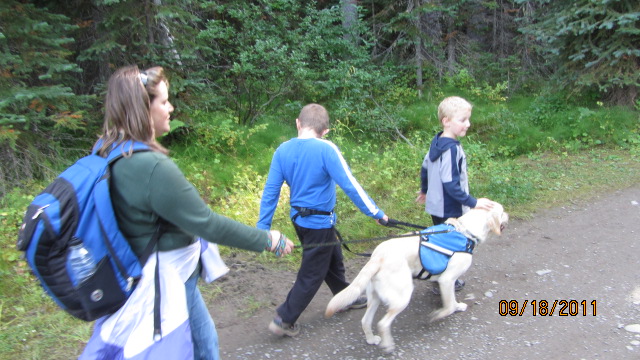Autism support dogs are relatively new to B.C., but they are making a big difference in the lives of children and families who are affected by the disorder.

Vancouver-based non-profit Autism Support Dogs was the first program in Western Canada to provide children living with autism with a support dog.
Since they graduated their first dog in 2008, the non-profit has placed 29 specially trained canine companions in families all around the province.
The dogs provide incredible support to children with autism, many of whom can’t speak or manage their own personal care or safety needs.
Because many children with autism have tendencies to run away or bolt, going out in public can be a safety concern.

Unlike guide dogs, who help the vision impaired live independently, autism support pooches allow whole families to go out together without fearing for their child’s safety.
The chair of Vancouver-based Autism Support Dogs Bill Thornton said children will walk holding a handle as well as being clipped to the dog’s jacket.
“The dog is taught if the child tries to run, the dog will sit and we found the child eventually stops bolting because they like being with the dog as well,” Thornton said, adding that the dogs can also lower aggression by providing comfort to the dog when they’re upset.
Thornton said because autism requires at least one parent to be alert at all times, having a support dog can give caregivers a much-needed break.
“In most cases it brings in positive changes in the child, particularly in public, but also at home.”
Since bringing the program to B.C., demand has been growing every year. Currently there are 40 families on the waitlist for an autism support dog.
Because early intervention is key to treating children with autism, parents can apply for a dog when their child is between three and 10 years old.
Training and preparation for life as an autism support dog costs $35,000 and the organization manages to train eight or nine a year.
With demand so high, Autism Support Dogs is beefing up their breeding program and hopes to help as many families as possible.
The non-profit receives no government funding and relies solely on private donations from individuals and businesses.
To learn more and to donate, visit the Autism Support Dogs website.
- Caught on video: B.C. firefighter survives hit-and-run outside his own home
- Surrey crime prevention group stunned as city cuts funding
- Woman acquitted in heated confrontation outside North Vancouver sushi restaurant
- B.C. electric vehicle sales continue to rise as survey finds softening Canadian interest




Comments